| Srl | Item |
| 1 |
ID:
074764


|
|
|
| 2 |
ID:
073819


|
|
|
| 3 |
ID:
074037


|
|
|
| 4 |
ID:
154464


|
|
|
|
|
| Summary/Abstract |
Studies of the relationship between the EU and NATO often focus on the limitations of cooperation, be it at the political or the operational level. However, little is known about the functioning of the political institutional linkages between the EU and NATO. This article therefore studies the main decision-making bodies of the two organisations at the political, ambassadorial level, namely the Political and Security Committee (PSC) of the EU and the North Atlantic Council (NAC) in NATO, as well as their joint meetings. The article employs an inductive Grounded Theory approach, drawing on open-ended interviews with PSC and NAC ambassadors, which reveal direct insights from the objects of analysis. The findings emphasise the impact of both structural and more agency-related categories on decision-making in these three fora. The article thus addresses both the paucity of study on these bodies more broadly and the complete lacuna on joint PSC–NAC meetings specifically, warranting the inductive approach this article endorses.
|
|
|
|
|
|
|
|
|
|
|
|
|
|
|
|
| 5 |
ID:
093950
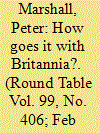

|
|
|
|
|
| Publication |
2010.
|
| Summary/Abstract |
Britain's international involvement has not been diminished by the loss of Empire; but it has altered drastically, in response both to reduced circumstances and to fundamental changes in world conditions. The transition has been made less difficult by the moderation and good sense of Commonwealth partners. It cannot be said to be complete until Britain has found a more satisfactory basis for a productive role within the enlarged EU, an indispensable element in the management of global interdependence. Among the arguments advanced in this article is that Britain's international involvement is not a matter of external policies and priorities alone. It is a function of the soundness of its economy and the strength of its national cohesion.
|
|
|
|
|
|
|
|
|
|
|
|
|
|
|
|
| 6 |
ID:
074771


|
|
|
| 7 |
ID:
074370
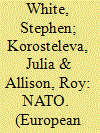

|
|
|
|
|
| Publication |
2006.
|
| Summary/Abstract |
Relations between Russia, Ukraine and Belarus and NATO have placed more emphasis on cooperation than confrontation since the Cold War, and Ukraine has begun to move towards membership. At the popular level, on the evidence of national surveys in 2004 and 2005, NATO continues to be perceived as a significant threat, but in Russia and Ukraine it comes behind the United States (in Belarus the numbers are similar). There are few socioeconomic predictors of support for NATO membership that are significant across all three countries, but there are wide differences by region, and by attitudinal variables such as support for a market economy and for EU membership. The relationship between popular attitudes and foreign policy is normally a distant one; but in Ukraine NATO membership will require public support in a referendum, and in all three cases public attitudes on foreign policy issues can influence foreign policy in other ways, including the composition of parliamentary committees. In newly independent states whose international allegiances are still evolving, the associations between public opinion and foreign and security policy may often be closer than in the established democracies.
|
|
|
|
|
|
|
|
|
|
|
|
|
|
|
|
| 8 |
ID:
069683


|
|
|
|
|
| Publication |
Santa Monica, Rand Corporation, 1999.
|
| Description |
xix, 113p.
|
| Standard Number |
0833027506
|
|
|
|
|
|
|
|
|
|
|
|
Copies: C:1/I:0,R:0,Q:0
Circulation
| Accession# | Call# | Current Location | Status | Policy | Location |
| 042318 | 355.0330475/SOK 042318 | Main | On Shelf | General | |
|
|
|
|
| 9 |
ID:
030024


|
|
|
|
|
| Publication |
Brussels, NATO Information Service, 1982.
|
| Description |
95p
|
|
|
|
|
|
|
|
|
|
|
|
Copies: C:1/I:0,R:0,Q:0
Circulation
| Accession# | Call# | Current Location | Status | Policy | Location |
| 021198 | 341.72/NAT 021198 | Main | On Shelf | General | |
|
|
|
|
| 10 |
ID:
074781
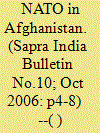

|
|
|
| 11 |
ID:
112598


|
|
|
|
|
| Publication |
Poland, Graphic Workshop, University of Warsaw, 2010.
|
| Description |
Pbk
|
|
|
|
|
|
|
|
|
|
|
|
Copies: C:1/I:0,R:0,Q:0
Circulation
| Accession# | Call# | Current Location | Status | Policy | Location |
| 054918 | 355.031091821/BAL 054918 | Main | Withdrawn | General | |
|
|
|
|
| 12 |
ID:
126360
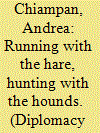

|
|
|
|
|
| Publication |
2013.
|
| Summary/Abstract |
This article reconsiders the negotiations between the United States and Britain at the outbreak of the 1982 Falklands War. The Reagan Administration did not support Britain, its staunchest NATO ally, and on the contrary assumed an even-handed position that recognised Argentina as a key ally as much as Britain. Not only did American mediation fail; it also caused a major crisis in Anglo-American relations. The underlying reason for the American decision was the obsessive importance that the Administration attached to fighting communism in Latin America after establishing covert co-operation with the Argentinian military junta in 1981.
|
|
|
|
|
|
|
|
|
|
|
|
|
|
|
|
| 13 |
ID:
127107
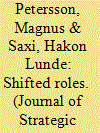

|
|
|
|
|
| Publication |
2013.
|
| Summary/Abstract |
During their 60 years within the North Atlantic Treaty Organisation (NATO), Denmark and Norway have experienced both high and low standings within the alliance, which can be attributed to both external and internal factors influencing their alliance strategies. During the 'first' Cold War and Détente, 1949-79, Danish and Norwegian alliance strategy aimed to simultaneously deter and reassure the Soviet Union. During the 'second' Cold War, 1979-89, Danish alliance policy became driven by domestic politics, and the Danish government was forced to formally dissociate the country from NATO's policies. Norway was not uncritical, but held a much lower profile. After the Cold War this situation shifted. Denmark successfully rehabilitated itself as a loyal and dependable ally by responding to the call for focusing on out-of-area operations. Meanwhile, Norway's continued focus on the lingering Russian Threat made the country seem out-of-touch with priorities in the post-Cold War alliance, and domestic politics prevented a more active out-of-area engagement.
|
|
|
|
|
|
|
|
|
|
|
|
|
|
|
|
| 14 |
ID:
027345
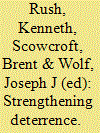

|
|
|
|
|
| Publication |
Cambridge, Ballinger Publishing Company,
|
| Description |
xvii, 270p.
|
| Standard Number |
0884108686
|
|
|
|
|
|
|
|
|
|
|
|
Copies: C:1/I:0,R:0,Q:0
Circulation
| Accession# | Call# | Current Location | Status | Policy | Location |
| 023210 | 355.031091821/RUS 023210 | Main | On Shelf | General | |
|
|
|
|
| 15 |
ID:
170816
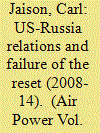

|
|
|
| 16 |
ID:
038479
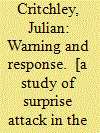

|
|
|
|
|
| Publication |
London, Leo Cooper, 1978.
|
| Description |
123p.
|
| Standard Number |
0850522439
|
|
|
|
|
|
|
|
|
|
|
|
Copies: C:1/I:0,R:0,Q:0
Circulation
| Accession# | Call# | Current Location | Status | Policy | Location |
| 019106 | 355.4/CRI 019106 | Main | On Shelf | General | |
|
|
|
|